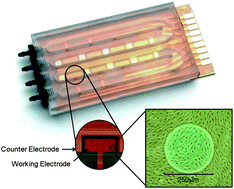A portable cell-based impedance sensor for toxicity testing of drinking water†
Abstract
A major limitation to using mammalian cell-based biosensors for field testing of drinking

* Corresponding authors
a Department of Biological Sciences, State University of New York at Cortland, Cortland, New York, USA
b
US Army Center for Environmental Health Research, Fort Detrick, MD, USA
E-mail:
mark.widder@us.army.mil
c Department of Biological Statistics and Computational Biology, Cornell University, Ithaca, NY
d Agave BioSystems, Ithaca, NY, USA
A major limitation to using mammalian cell-based biosensors for field testing of drinking

 Please wait while we load your content...
Something went wrong. Try again?
Please wait while we load your content...
Something went wrong. Try again?
T. M. Curtis, M. W. Widder, L. M. Brennan, S. J. Schwager, W. H. van der Schalie, J. Fey and N. Salazar, Lab Chip, 2009, 9, 2176 DOI: 10.1039/B901314H
To request permission to reproduce material from this article, please go to the Copyright Clearance Center request page.
If you are an author contributing to an RSC publication, you do not need to request permission provided correct acknowledgement is given.
If you are the author of this article, you do not need to request permission to reproduce figures and diagrams provided correct acknowledgement is given. If you want to reproduce the whole article in a third-party publication (excluding your thesis/dissertation for which permission is not required) please go to the Copyright Clearance Center request page.
Read more about how to correctly acknowledge RSC content.
 Fetching data from CrossRef.
Fetching data from CrossRef.
This may take some time to load.
Loading related content
